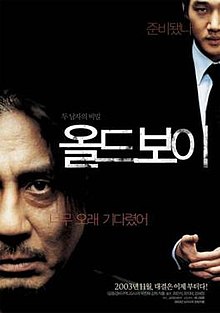I
Oldboy (2003) is a revenge thriller with elements of action, mystery, and romance intertwined. The first is evidenced by the heavy emphasis throughout on suspense, excitement, and tension as protagonist Oh Dae-su frantically pieces together the reason for his 15-year imprisonment. This also relates to the film's classification as a mystery; for a portion of the film, the plot is a whodunit of sorts. Elements of action are prominent in the numerous fight scenes as well as the protagonists' scurrying around the city. Finally, the romantic aspect of the film is the relationship between Dae-su and his newfound love Mi-do; furthermore, the power of love is explored through the film's overall story.
Regarding connections to other works, there are two that are stated by director Park Chan-wook. First of all, the film is loosely based on the Japanese manga of the same name. Additionally, it is the second entry in Park's Vengeance Trilogy, spiritual successor to Sympathy for Mr. Vengeance (2002) and succeeded by Sympathy for Lady Vengeance (2005). Like its companions, Oldboy deals with themes of revenge, violence, and salvation. Aside from these, the film can be described as Kafkaesque, being particularly comparable to Kafka's The Trial, in which protagonist Josef K. is also obliviously imprisoned.
The director of the film is acclaimed South Korean filmmaker Park Chan-wook. The evident main purpose of the film is not to entertain, although that may well be one of its other goals, but to provoke thought regarding the film's themes. Furthermore, Park wishes to instill in his audience some degree of new knowledge for the future.
As stated, this is the second installment in the informal Vengeance Trilogy. Like its two companions, its narrative depicts a character being wronged and gaining his or her revenge. However, none are entirely black and white. Like in the other two, Oldboy's antagonist Lee Woo-jin acts with an understandable motive, making him more tragic than despicable. I can't say whether or not it shares any visual or technical elements with any of Park's other work, as this is the only film of his that I have seen.
The film contains numerous themes. The most prominent are those that I've mentioned ad nauseum: revenge, violence, and salvation. Both protagonist and antagonist act out of revenge: Dae-su for his imprisonment, Woo-jin for a wrong committed long ago in the past. Additionally, both utilize violent methods to enact said revenge. The theme of salvation is explored as Dae-su redeems a number of past wrongs. Another important theme - time, or the lack thereof - is explored in Dae-su's fifteen years in containment and the protagonists' need to solve the mystery within five days; furthermore, clocks are a recurring symbol throughout the film. Lastly, love is another of Oldboy's most remarkable themes. Almost everyone is or was in love: Dae-su, Woo-jin, Mi-do, and others all fall under one another's spell.
This film is aimed very much towards an intellectual audience, those who are able to comprehend and thus change according to the messages sent in the film. Park wishes to make a change with this movie, but can only do so if the audience comprehends and embraces the change he is calling for.

No comments:
Post a Comment